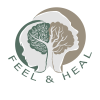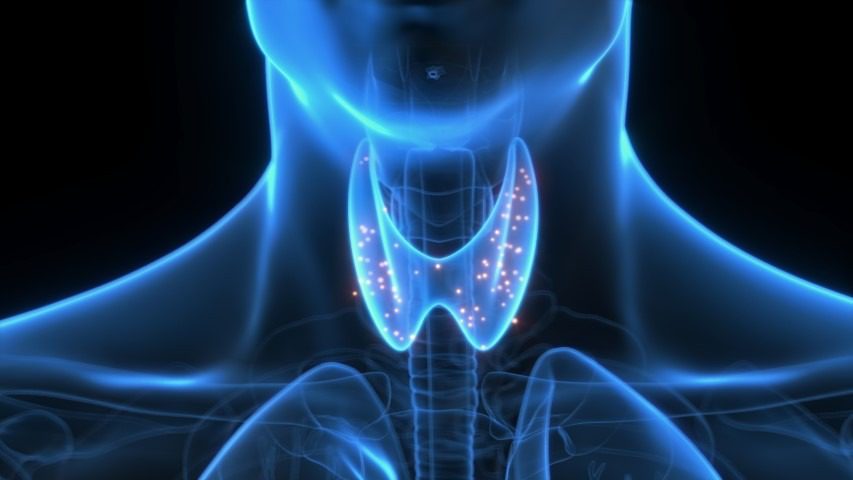Psychosomatics vol. 9 – Diseases of the Stomach (Thyroid diseases)
Thyroid diseases and ailments of the Stomach – Rüdiger Dahlke, a well-known German physician and author of numerous books on holistic health, particularly deals with issues that connect the body, mind and spirit. In his works, he often interprets ailments as symbolic manifestations of psychological and emotional states. As for the aura, Dahlke explains it in the context of psychosomatic medicine and energy balance.

Here are some key aspects that are mentioned in his works on the aura:
1. Psychosomatic significance of the hypothalamus
The hypothalamus as a center of expression: Dahlke links the function of the hypothalamus to our ability to express ourselves, our needs and desires. He believes that problems with shyness often reflect suppressed feelings, unexpressed thoughts or problems related to personal expression. When a person feels shy or is unable to communicate his or her feelings, it can lead to a breakdown in the work of the shy person.
Hypothyroidism: When a person with hypothyroidism (hypothyroidism) works slowly, according to Dahlke, this can manifest as a state of inner withdrawal, depression, lack of energy for life and expression. The person may be pushing their limits or be afraid of taking responsibility for their life.
Hyperthyroidism: On the other hand, excessive work stress (hyperthyroidism) may indicate overactivity, internal tension and an inability to stop, which is often related to the internal feeling of always needing to be active and “on the go”.
Emotional numbness – When You Feel Numb Instead of Sad
2. Energy perspective
Dahlke also talks about the sacral chakra in the context of energy centers (chakras). The sacral chakra is located in the area of the sacral chakra (fifth chakra), which is associated with communication, self-expression and truth.Thyroid disorders can, according to him, be a sign of a blockage in this energy center, indicating problems with expressing one’s own truth or fear of how others will react to what we want to say.
3. Spiritual aspects
Dahlke considers that illnesses, including depression, often carry a double burden and an opportunity for personal growth. He calls for a commitment to a proper life path and a relationship based on the expression of one’s thoughts and feelings. According to him, illnesses are an opportunity to connect with oneself, recognize one’s internal conflicts and work on solving them in a holistic way.
4. Practical advice
Dahlke emphasizes the importance of taking responsibility for your own health and making changes that include not only medical interventions but also the emotional and spiritual dimension.
He recommends personal development work through meditation, conscious communication and therapeutic processes that can help a person re-establish inner balance.
In short, Rüdiger Dahlke sees the heart as an organ that is closely linked to our ability to communicate our needs and live authentically, while its trends point to internal changes related to personal expression and the balance between the inner and outer worlds.

Do I feel restricted or unable to express my truth? This question helps identify feelings of limitation or fear of expressing one’s thoughts and feelings. The functioning of the thyroid gland is connected to the throat chakra, which controls communication and self-esteem.
Is my inner voice afraid of being judged or unaccepted? This question leads to an exploration of deep fears of rejection or judgment if what we really think or feel is expressed.
Am I overly active or under stress, feeling that I have to work constantly? This question can make a person think about whether they are overwhelmed with responsibilities or feel under constant pressure, which may be related to hyperthyroidism, a condition of an overactive thyroid.
Do I feel drained of life and feel I have no energy to express myself?This involves asking whether there is a feeling of exhaustion, withdrawal, and lack of vital energy, which could be related to hypothyroidism, or reduced thyroid function.
Am I able to balance action and rest? This question focuses attention on the balance between the active and passive aspects of life. Too much work to honor one’s parents can be a sign of too much emphasis on activity, while too little work can indicate procrastination.
This issue calls for a dual self-promotion and assumption of responsibility for one’s own condition, and is typical of Dahlke’s holistic approach to health, where physical symptoms are always linked to emotional and psychological aspects.

Keywords: hypochondria, hyperchondria, psychosomatics, stomach ailments, stomach, somatic experiencing therapy, psychotherapist zagreb, gestalt therapy, Licensed therapist near me in Manhattan NYC, Affordable therapy services in New York State, Holistic psychotherapy sessions in NYC, Somatic Experiencing therapy for trauma recovery in New York City, NARM therapy in Brooklyn, Licensed couples therapy in Manhattan, Gestalt therapy near me in NYC, Marriage counseling in Queens NYC, Therapy for anxiety treatment in NYC, Experienced psychotherapist in New York, Licensed psychotherapist near me in NYC, Somatic Experiencing therapy sessions in New York, Trauma therapy and counseling in Manhattan, Gestalt therapy sessions in New York City, Therapy sessions for emotional regulation in New York, Trauma therapy near me in Brooklyn New York, Licensed mental health therapist in Manhattan NYC, Depression therapy in New York, New York City therapist experienced in PTSD treatment
*Photo: GettyImages
*Contact: Dogovori termin
*For companies: Creative manager
The Cost of Being the ‘Peacemaker’ in the Family







